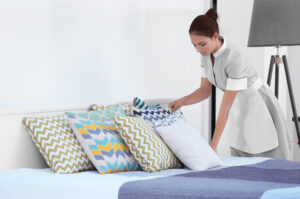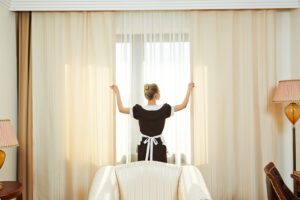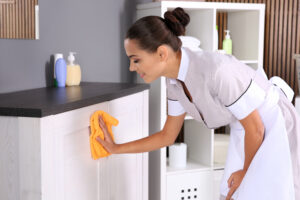Why Are Panic Buttons Essential for Hotels?
90% of housekeepers in the U.S. are women and most are required to work alone and are often separated from their teams. Workers who work alone or work late at night are more at risk of becoming victims of violence, a 2016 study found that 9 out of 10 Hospitality workers suffered some type of abuse during their dealings with guests. As a response, numerous cities and states have passed hotel panic button laws that require hotels to provide their employees with panic buttons as a safety measure. Major hotel brands have also made the commitment to equipping employees with safety devices/panic buttons as a part of the AHLA’s 5-star promise.
What Risks Do Hotel Housekeepers Face?
- Sexual and physical assault: Due to the isolated nature of their jobs, hotel housekeepers are usually separated from their teams, and some must come in close contact with guests. Consequently, many are at risk of being physically harmed while working alone in guest rooms.
- Sexual harassment: Housekeepers are often required to work alone, and as a result they are at risk of being sexually harassed during work. Some have been subjected to unwelcomed sexual comments and unwanted touching during their dealings with guests.
- Physical injury: Hotel housekeepers perform physically demanding jobs that is crucial to the hotel’s operation. They are required to vacuum, clean all areas of the bathroom, remake beds, and dispose of used linen and garbage, just to name a few. Housekeepers may slip, fall, or otherwise accidentally injure themselves while performing these duties.
- Medical emergency: During the course of their jobs, housekeepers may suffer a sudden and unexpected medical emergency, such as a heart attack or stroke and will require medical attention.
Why Are Panic Buttons Essential?
According to the Occupational Safety and Health Administration (OSHA), each year 2 million people report being victims of some type of workplace violence. Surveys across the globe reveal that housekeepers are sexually assaulted at twice the rate as those in other industries. Hotel employees are often subjected to harassment and inappropriate behaviors by guests. A 2016 study found that 58% of hotel workers had been sexually harassed or assaulted while at work.
The report uncovered the following:
- Over 45% of employees have been subjected to indecent exposure (guests were naked when they answered the door, exposed themselves, or flashed)
- Over 20% experienced unwanted sexually suggestive looks or gestures
- Over 15% experienced unwelcome sexual comment, jokes or questions
- 15% of employees have been cornered by guests
- 10% have been subjected to unwanted touching (kissing, grabbing, pinching, patting, groping)
- More than 10% have been pressured for a date or sexual favors
How Can Panic Buttons Keep Employees Safe?
Panic buttons are employee safety devices that can be carried by employees or attached to their clothing, employees can press panic button devices during an emergency and receive immediate assistance. When panic button devices are pressed, an emergency alert is sent out to the hotel security personnel with the exact location of the employee in distress, down to the precise floor and room number. Panic buttons are designed to send alerts in real time and is continuously updated if the employee in distress changes location, allowing responders to locate the employee within minutes. These safety devices can also be configured to alert designated hotel security personnel or emergency responders in the event of a medical emergency. And devices will continuously send out alerts until the issue has been resolved.
Panic Button Key Features
- Panic buttons can be configured to send emergency alerts to predetermined emergency contacts or to local authorities.
- Panic buttons transmit locations down to the precise floor and room number where the distress signal originated.
- Information is sent in real time and is updated if the employee in distress changes location.
How Can Hotels Benefit form Panic Buttons?
Protect Employees Anywhere on Hotel Property
Hotel panic buttons help employees to better respond to co-workers and guests who are in distress. Panic buttons are not only beneficial for guest room staff, but they are also beneficial for employees who work in any area of the hotel. Employee safety devices can help to protect front desk associates, restaurant workers, employees who work in pool areas or those who work in hotel spas. Equipping them with safety devices allows them to get assistance immediately when faced with medical emergencies or threatening situations.
Attract Prospective Employees
The Hospitality Industry is currently facing a major labor shortage, a May 2022 survey conducted by the AHLA found that 97% of hotels were experiencing staffing shortages and 49% considered those shortages to be severe. Investing in a panic button system will aid in the effort to attract more candidates, by offering prospective employees a safe work environment. Safety is important to employees and hotels that take employee safety seriously are more likely to stand out to potential employees.
Retain Employees
Staff turnover rates in the Hospitality Industry is significantly higher than in other industries and rates now slightly exceed pre-pandemic levels, room attendant turnover is over 103% annually. Employees are more likely to stay with hotels where they feel safe and supported. Investing in an employee safety system will ensure that employees are able to send out emergency alerts when they are in unsafe or uncomfortable situations and know that they will receive assistance immediately.
Meet Brand Standards and Legal Requirements
Numerous cities and states have passed hotel panic button laws and have set specific guidelines as to what constitutes as a panic button device. Major hotels brands have also specified panic button requirements that their properties are required to adhere to. Panic button devices should have the ability to provide precise location information down to the exact floor and room number and as the location changes, panic button devices should send updates in real time. This will allow responders to locate the distressed employee within minutes of an emergency alert.
Hotel Panic Buttons should provide:
- Reliable geolocation capability with the ability to locate employees down to room-level accuracy.
- Panic button devices should consistently work in all locations, including guest rooms, public restrooms and areas that require employees to be alone with guests.
- Panic button devices should be easily activated by a single action like a push, pull or tap. They must provide a sustained signal without delays caused by entering passwords or waiting for the system to turn on.
- Panic buttons should have the capability to dispatch responders immediately when an emergency alert is sent.
- Panic button devices should minimize unintentional activation and resist possible disabling by attackers.



